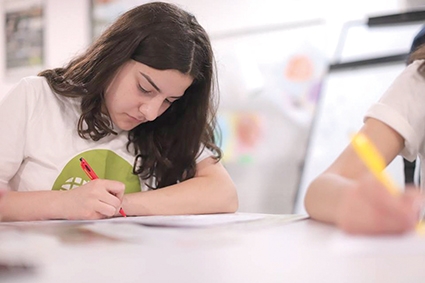Future Journalist Finalist on Georgia & the EU
The Future Journalist competition gives Georgian youth throughout the country the chance to showcase their journalistic skills in three stages, with the ultimate prize a two-week English and Journalism course in the UK this summer. Organized by Georgia Today Education and supported by UK Bridge, the competition aims to discover the best future journalists in Georgia. This year’s winner was 15-year-old Mariam Makhviladze from Gori (central Georgia), who interviewed UK Ambassador Justin McKenzie Smith before winning the final round with the article below.
Georgia is a country in the region of the South Caucasus which has aimed to establish and maintain friendly relations with European countries since the 18th century, if not before. This year is the 100th anniversary since this small, European country gained independence and became a Democratic Republic. During this time, and especially since the collapse of the Soviet Union, Georgia has developed relations with European countries in many areas, including education, politics, economics, culture, and military.
One of the first supportive countries was Germany, which in 1918 gave important support, including military forces, to Georgia when it became a Democratic Republic. Further, the first Georgian national anthem was based on that of Germany. Other supporting countries were the United Kingdom and France. These two countries helped Georgia to maintain its independence until 1921 when, sadly, the situation changed with the occupation of the country by Soviet troops.
Today, Georgia has a lot of goals which are connected to its Euro-integration. This means that Georgia tries to develop economically and be a sustainably attractive and developed country.
Georgia has not only signed agreements with the EU, the most important economical and political union in Europe, but also at the end of the 20th century, Georgia became a member of the European Council. Vital for the country’s Euro-integration is the Association Agreement which aims to provide Georgia with the opportunity to send high-quality, Euro-standard produce to European markets.
Ongoing exchange programs for students also make it possible for Georgian youth to experience the European ways. Implemented by the European Council, the Erasmus program (for students) and Erasmus+ (for school pupils) is one example.
Since Georgia became a member of the European Council, it has based its Constitution on European values which are fundamental to the rights of each individual: tolerance, freedom of expression, pluralism in democracy and so on.
Finally, it must be noted that Georgia engages in ongoing educational programs and business, cultural and tourism activities to establish and expand relations with European countries. Many of these activities are a precondition of sustainable social development, without which there can be no friendly relations between the citizens of Europe and Georgia- a vital link essential for Georgia’s approximation with the European Union.
By Mariam Makhviladze












